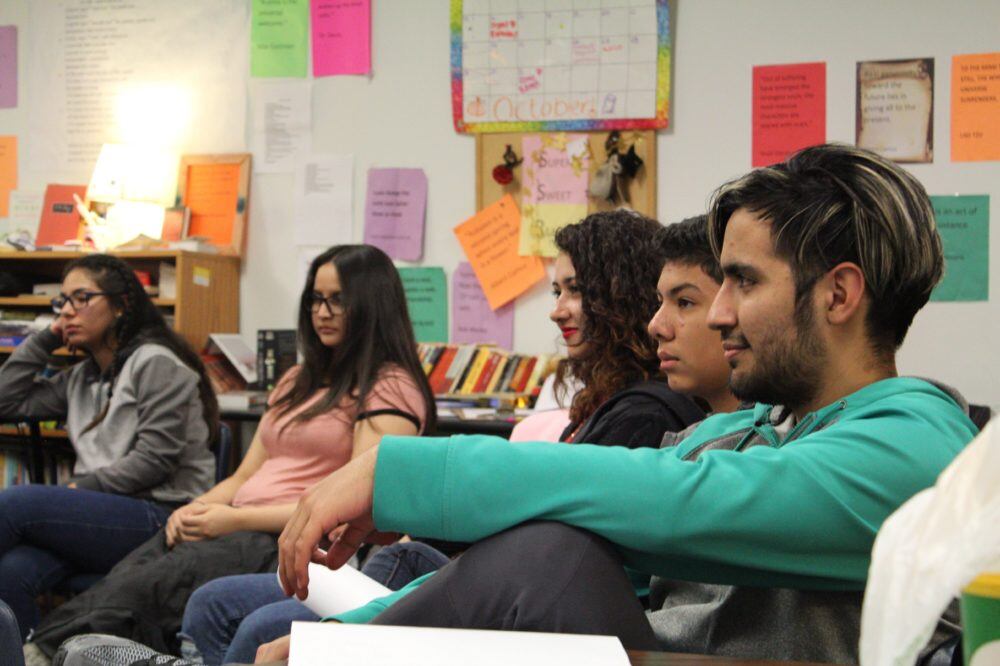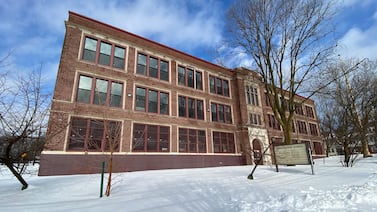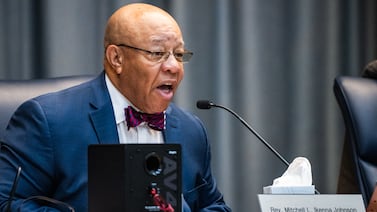Teachers at the New America School charter network are attempting to form Colorado’s first charter school union.
Educators at the three New America campuses in the metro Denver area say teacher turnover threatens the qualities that made them want to work there in the first place. They want a legally recognized voice at the table to guide improvements at the school.
“Our students come to us because we’re small and focus on relationships and restorative practices first. Students tell us they haven’t had that before. That’s probably the reason I come to school every day,” said Collette Simkins, an art and drama teacher at New America’s Thornton campus and a leader in NAS Educators United. “When there is such a high level of turnover, they’re filtering through teachers just as frequently as they did in a traditional school, and we lose what makes us different.”
That teacher working conditions are student learning conditions is a common refrain from teachers unions. What’s unusual is that the conversation is happening at a charter network.
These publicly funded but independently run schools are based on the idea that flexibility and autonomy better serve students. Decades ago, unions supported the idea of charter schools as teacher-led centers of innovation, but later turned against them. Charter schools often employ practices unions oppose, such as hiring unlicensed teachers, basing pay on performance, and providing fewer job protections.
But teachers unions increasingly have expanded into the charter sector, especially in states like Illinois and California. Amie Baca-Oehlert, president of the Colorado Education Association, said the state teachers union isn’t actively organizing charter teachers, but it’s open to talking to anyone who feels they would benefit from representation.
Erin Anderson, an assistant professor of educational leadership and policy studies at the University of Denver’s Morgridge College of Education, said the phenomenon hasn’t been well studied “because nobody thought it was going to be a thing.”
“It was, unions do one thing and charters do another. Yet the issues that teachers bring forward are exactly the issues that led to teacher unionization in the first place,” she said.
Those include low pay, pay disparities, and workload. Often, teaching in a charter school can be demanding.
“It’s a young person’s game to be a teacher in a charter,” she said.
New America School teachers presented a petition signed by three-quarters of the teaching staff to the network’s board of directors in October. Since then, the board has met repeatedly in closed session and in public in March to discuss the legal and financial implications of recognizing the union. The board plans to vote in April.
“I believe the board is doing their due diligence in researching, asking questions, and exploring possible options to address this complex and unprecedented ask,” Superintendent Dan McMinimee said in an email.
Founded in 2004 by now-Gov. Jared Polis, the New America School aimed to serve recent immigrants and their families. Today, the schools serve students ages 14 to 21 from a range of backgrounds. The majority of students are students of color from low-income families, and 71% are English learners.
They’re spread across three campuses in Lakewood, Thornton, and Aurora. The Lakewood and Thornton schools are authorized by their respective school districts, Jeffco Public Schools and Adams 12 Five Star Schools, while the Aurora campus is authorized by the state Charter School Institute. Board members raised questions about the challenges of creating uniform policies for all three campuses, when each has different funding and different conditions in its authorizing agreement.
Adding to the schools’ financial challenges, enrollment has dropped by half over the last five years to around 500 students this school year. McMinimee said gentrification has pushed out families, and more students feel the need to work. In turn, the schools are leaving more positions vacant as teachers leave.
At the March meeting, McMinimee said he reached out to teachers to see if they would be open to creating an advisory group or other input system that stops short of a collective bargaining agreement, an idea that board members seemed more open to than union recognition. McMinimee said he shares teacher concerns about turnover, though he noted that nearly every school is struggling with resignations right now.
Teachers say they want their union recognized.
“We are unionizing because we love this school as much as they do, not because we want to see the buildings close,” Simkins said. “I don’t think unions inherently eliminate flexibility. Regardless of where I work, I still deserve rights. Unions for me, ultimately, are about the people doing the work having a voice.”
Under Colorado law, school districts don’t have to recognize their teachers unions, though several dozen districts have done so. Legislation to guarantee collective bargaining rights for all public sector employees still hasn’t been introduced this year, and if it is, it’s likely to exclude K-12 teachers.
Private sector employers, though, can be required to recognize a labor union if members hold an election that meets certain conditions, and the National Labor Relations Board has determined some charter schools to be private employers.
Under the advice of the Colorado Education Association, Simkins said New America School teachers believe they are public sector employees, and they’re seeking voluntary recognition. But Scott Moss, Colorado Department of Labor and Employment division director for labor standards and statistics, said he’s not sure charter schools should be considered public sector employers.
“The Colorado Department of Education considers charter schools public schools for purposes of public education, but that’s not the same thing as them being public employers for purposes of labor law,” Moss said.
Many non-profit organizations contract with the government to provide services and receive all or most of their funding from tax dollars, Moss said, but that doesn’t make them government entities.
Anderson said charter school leaders should take teachers’ interest in unionization seriously.
“The unions are reaching out, and they are finding teachers on the other end who think there is a structure that they need,” she said. “I think we need to have some real conversations around how we treat teachers and what is missing from how we support them.”
Bureau Chief Erica Meltzer covers education policy and politics and oversees Chalkbeat Colorado’s education coverage. Contact Erica at emeltzer@chalkbeat.org.





